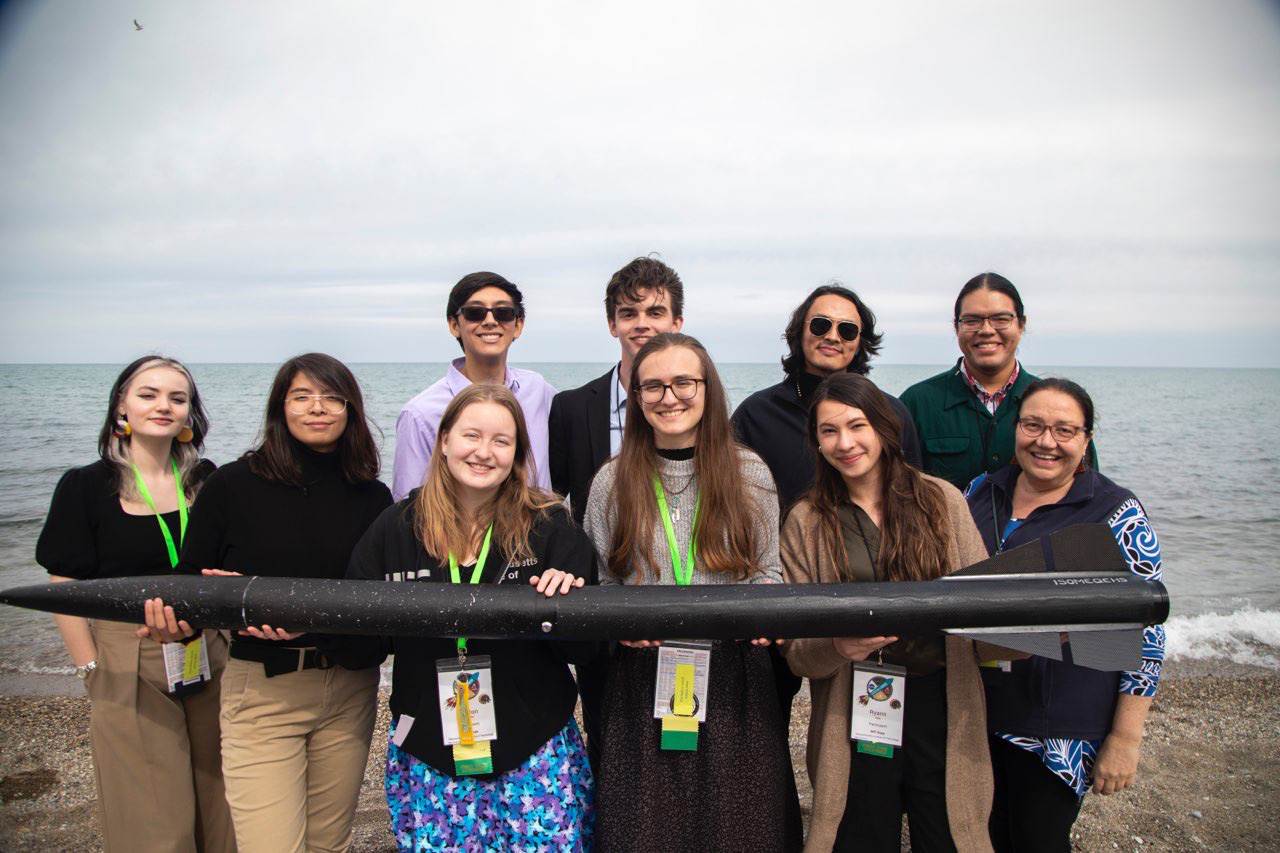
MIT Doya blasted their first rocket to a height of 1,290 meters, placing second at the 2023 First Nations Launch contest. The team is now gearing up for a 2024 launch.
Janine Liberty | Department of Aeronautics and Astronautics
Earlier this year, MIT’s First Nations Launch team participated in the 2023 First Nations Launch, an international NASA-Artemis Student Challenge hosted by the Wisconsin Space Grant Consortium that focuses on Indigenous representation and science in aerospace engineering through rocketry. It was the first time MIT has ever competed in this challenge, now in its 15th year.
Over two semesters, an all-Indigenous team of students including both undergraduates and grad students came together to design, build, test, document, present, and launch a roughly 8-foot rocket made from scratch entirely at MIT. The 2023 challenge in particular required the team to develop carbon fiber and fiberglass composite layup techniques in order to create an airframe that was as light as possible while maintaining structural integrity.
“I didn’t really think I’d be joining a rocket team, and then I’d heard there was an all-Indigenous build team starting. I thought, yeah, this could be a good way to connect to the community here,” says Peyton Meader, a Passamaquoddy Tribe member who joined the team as a first-year and serves as the safety/avionics lead.
The team chose the name Doya (ᏙᏯ), meaning “beaver” in the Cherokee language; the name was suggested by team member Hailey Polson, who is a Cherokee citizen. At the First Nations Launch contest last spring, MIT Doya successfully blasted their rocket to a height of 1,290 meters, ultimately receiving the second-place grand prize award. The team was also named rookie team of the year.
“A journey to the stars and the sky”
Built into MIT Doya’s approach are the Indigenous ethos of relationality and intentionality, and values such as efficiency — using minimal materials to reduce waste, and respectful purpose — taking time to consider alternatives and try ideas with the goal of advancing knowledge and understanding, rather than the fastest route to success.
After the rocket was completed, the team performed a smudging ceremony by Lake Michigan before the competition began. Smudging is a blessing and purification ritual that typically involves burning sage, and which is an important Indigenous cultural practice.
“Taking a journey to the stars and the sky is a very Indigenous concept, and it’s something that’s very close to us in all our stories. To visit Father Sky in that way, and go with respect, to try to find out new things and carry with it our hopes and send our good wishes. I think Indigenous people are drawn to aerospace for that fact,” says Nicole McGaa, who served as team captain in 2022-23 and is now the team’s project manager. “I think Western rocketry is very hesitant to commit to the heart of what we’re doing … To me, Indigenous methodology and aerospace engineering is pushing away from that, and having the bravery to say, aerospace is something that is for our minds, for our inspiration, for the wonder of it all — and that alone is enough.”
Meet the team
The Doya team is currently gearing up for the 2024 First Nations Launch Challenge in Wisconsin. All of the members from 2022-23 have returned, and two first-year undergraduates have joined. Sophomore Hailey Polson has stepped up as captain.
2023-24 MIT Doya (First Nations Launch team):
- Hailey Polson, Cherokee Nation, captain and second-year AeroAstro major
- Nicole McGaa, Oglala Lakhota, project manager and fourth-year AeroAstro major
- Juan Alvarez, Muisca, second-year AeroAstro major
- Maranda Cherry, Métis Nation, graduate advisor and master’s student in AeroAstro
- Alvin Harvey, Diné of the Navajo Nation, outreach lead and doctoral student in AeroAstro
- Ryann Hee, Kānaka Maoli, doctoral student in AeroAstro
- Peyton Meader, Passamaquoddy, second-year chemical engineering major
- Jeremy Minniear, Pechanga, second-year materials science and engineering major
- Katya Shephard Johnson, Native Hawaiian, first-year student
- Alex Zhindon-Romero, Cañarí, first-year student
The team is advised by Jeffrey Hoffman, MIT professor of aeronautics and astronautics, and Nina Lytton, Office of Religious, Spiritual, and Ethical Life spiritual advisor to the Indigenous community. It is also supported by Aaron Ashley ’16, president of Indigenous Alumni of MIT and First Nations launch mentor. The team was sponsored by MIT’s chapter of the American Indian Science and Engineering Society, the Edgerton Center, and the Massachusetts Space Grant Consortium.
This year’s First Nations Launch challenge calls on teams to design, build, and test a rocket as well as a special payload that will deploy at apogee. The payload must have its own parachute system and contain a drone similarly designed and built by the team, which will be piloted by a certified team member from 400 feet above ground level to a specific landing zone.
In addition to addressing this year’s technical challenge, the team plans to emphasize outreach efforts spearheaded by AeroAstro PhD student and team outreach lead Alvin Harvey. Team members are currently organizing events to engage local Indigenous youth, which will introduce students to various STEM principles such as the fundamentals of rocketry, focusing on the unique perspective of Indigenous science by maintaining connections to traditional knowledge. The goal of these events is to expose Indigenous youth to opportunities in higher education and STEM fields while emphasizing that these pursuits do not require sacrificing their culture or community ties.
Any member of the MIT community wishing to join the team, learn more, or get involved with outreach efforts can contact fnl-exec@mit.edu.
